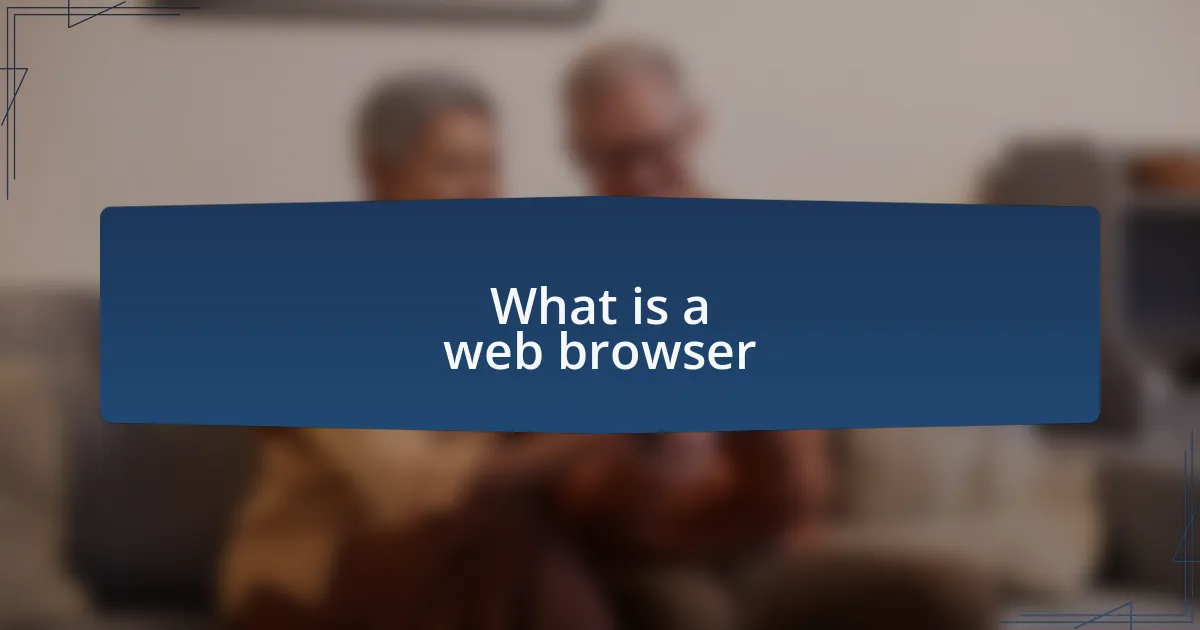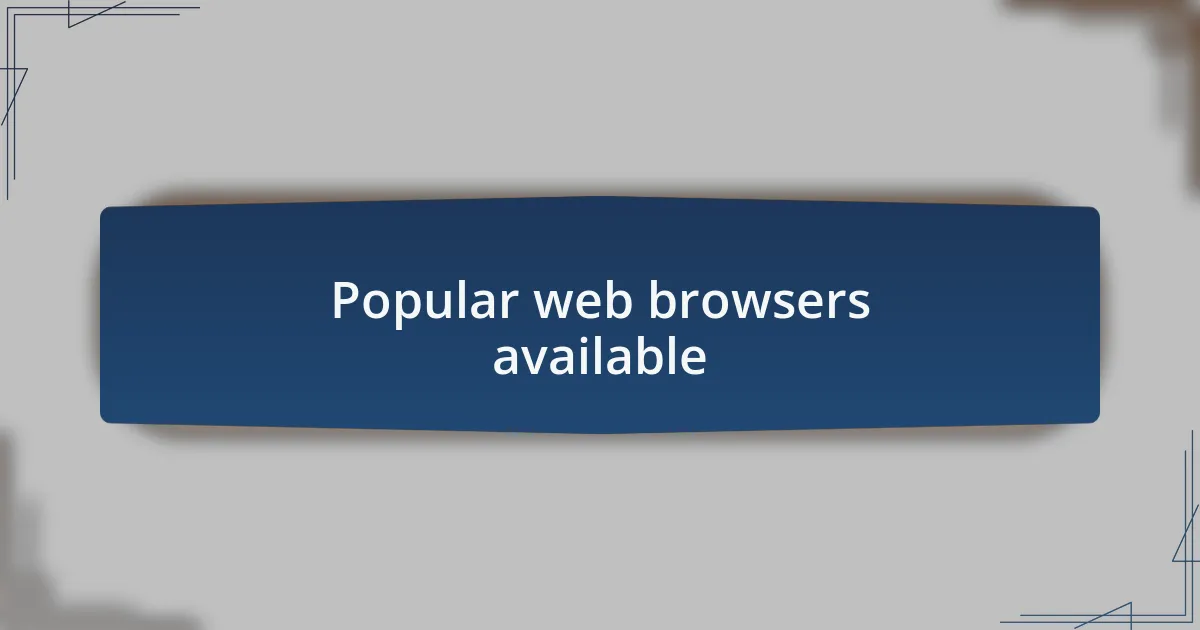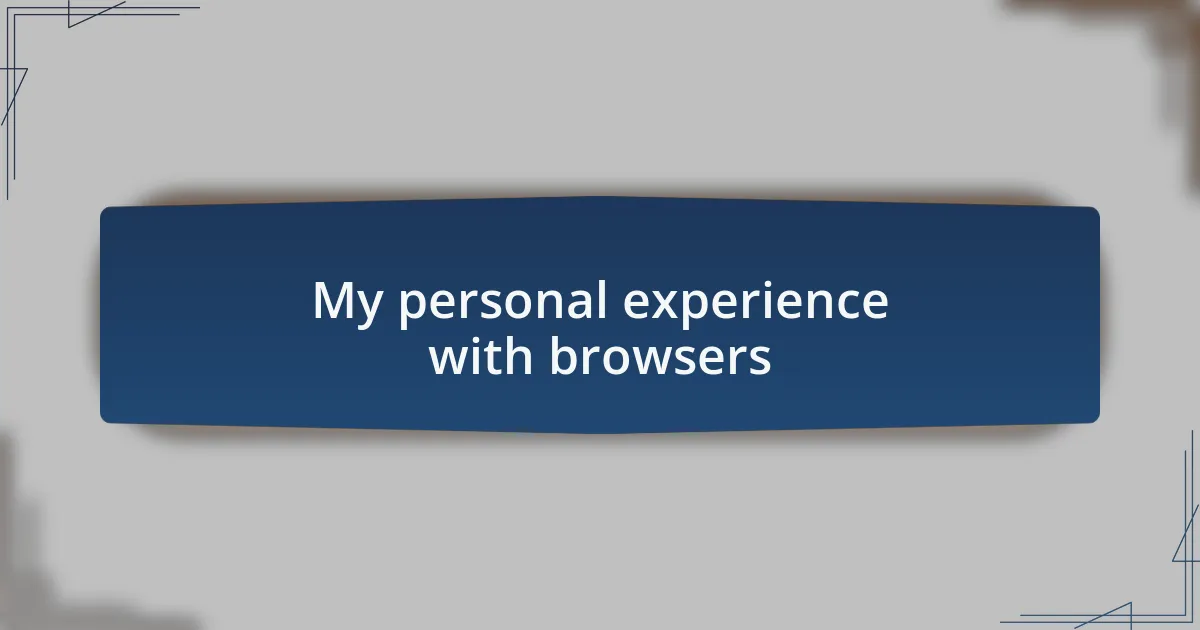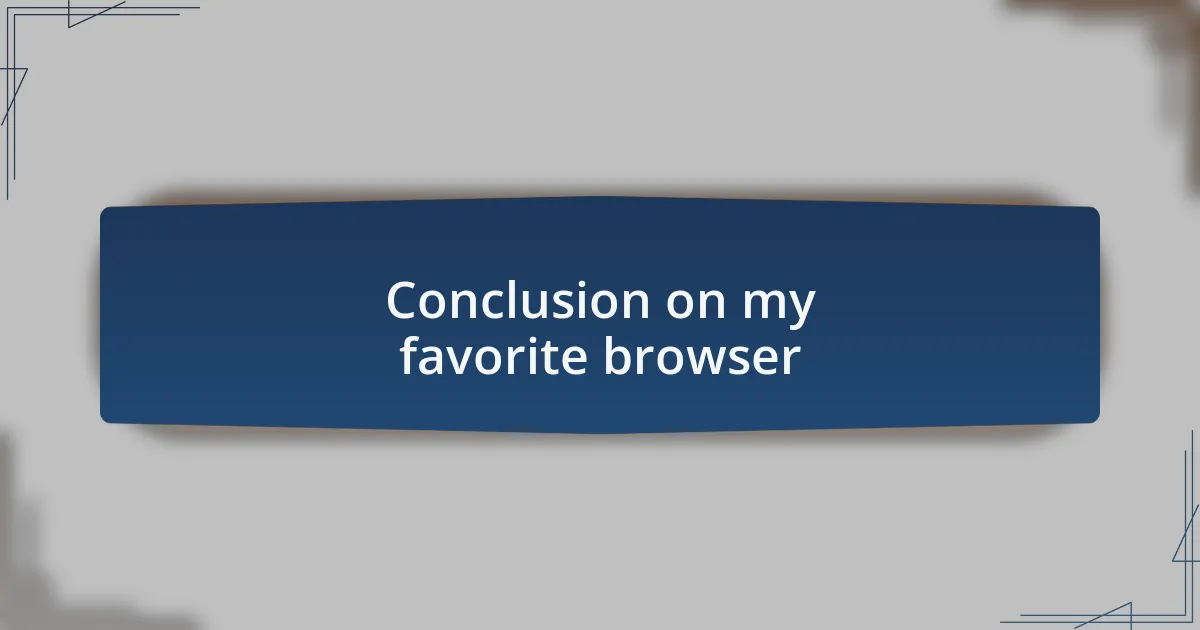Key takeaways:
- A web browser is essential for accessing and navigating the internet, translating web content and providing features like bookmarking and security.
- Choosing the right browser greatly impacts online experience, with considerations for speed, security, usability, and customizability.
- Popular browsers include Google Chrome, Mozilla Firefox, Microsoft Edge, and Safari, each offering unique features that cater to different user preferences.
- The author’s personal journey highlights a preference for Firefox due to its privacy features and the empowerment it offers in managing personal data online.

What is a web browser
A web browser is essentially a software application that allows users to access and navigate the internet. I remember the first time I opened a web browser; it felt like unlocking a door to a vast new world filled with information and connectivity. Isn’t it fascinating how a single tool can bridge the gap between us and countless resources, websites, and online experiences?
At its core, a web browser translates web content, serving as an intermediary between you and the vast array of data available online. When I first learned about HTML, the language that structures web pages, it was eye-opening. I realized that every website I visited was shaped by code that browsers decipher and render for us. It’s like having a translator for a language you don’t speak yet, wouldn’t you agree?
Web browsers do more than just retrieve information; they also provide features like bookmarking, tabbed browsing, and security measures to protect our data. I often reflect on how these functionalities enhance my browsing experience. For instance, I can save articles to read later without getting distracted, or switch between tabs seamlessly, which makes my online life so much easier. How many times have you found yourself overwhelmed with open tabs and wished for better organization? Browsers have evolved to address these needs, transforming our digital navigation.

Importance of choosing a browser
Choosing the right browser is more than a simple preference; it significantly impacts your online experience. I remember switching from one popular browser to another and feeling a marked difference in speed and responsiveness. Have you ever noticed how a few extra seconds can feel like an eternity when waiting for a page to load? This is why picking a browser suited to your needs is crucial.
Security also plays a vital role in the browser selection process. I used to underestimate the importance of protection against online threats until I faced a phishing attempt. It was a wake-up call that highlighted the need for robust security features in a browser. How safe do you feel knowing your sensitive information is protected? Now, I make it a point to choose a browser that prioritizes user safety, ensuring my data remains secure.
Usability and customizability can significantly enhance my browsing rhythm. Finding a browser that aligns with my habits has improved my productivity. For example, I appreciate the way some browsers allow shortcuts for frequently visited sites. Have you ever thought about how small changes can make a big difference? The right choice can elevate the mundane browsing experience into something efficient and enjoyable.

Popular web browsers available
When discussing popular web browsers, a few names consistently rise to the top: Google Chrome, Mozilla Firefox, Microsoft Edge, and Safari. Personally, I was drawn to Chrome for its seamless integration with Google services, making my online life more cohesive. Have you ever noticed how one tool can streamline so many tasks? It felt like stepping into a well-organized workspace rather than a cluttered desk.
Firefox, on the other hand, captured my attention with its emphasis on privacy and independence. I recall a time when I was reading about data tracking and realized how much I valued my online privacy. Exploring the various privacy settings in Firefox was like finding hidden gems in my toolbox. What browser features do you think are essentials for your online comfort?
Microsoft Edge offers a compelling experience with its efficiency and smooth performance, especially since its overhaul based on Chromium. I was pleasantly surprised by how well it handled heavy tasks without lagging, which was particularly helpful during online meetings. When was the last time a simple browser impacted your workflow positively? With so many great options, it’s all about finding the right fit for your unique browsing habits.

My personal experience with browsers
Embarking on my journey through various web browsers has been quite enlightening. I vividly remember my initial foray into browsing when I tried Internet Explorer; it felt incredibly limiting compared to the flexibility of modern options. Eventually, I transitioned to Chrome, and the difference was striking—it was like moving from a small, cramped room into a spacious, well-lit office.
As I navigated through different browsers, Firefox began to resonate with me deeply, especially after I attended a webinar on digital privacy. I was taken aback by how many companies track our every move online. This new awareness made me appreciate Firefox’s robust privacy features even more; it felt empowering to take control of my data, even if it was just one small step.
More recently, I’ve been experimenting with Microsoft Edge. I remember the first time I opened it and discovered how efficiently it handled tabs when I was juggling multiple projects. Have you ever experienced a browser that just seems to understand your needs? That day, I realized that having the right tools can make all the difference in enhancing my productivity.

Conclusion on my favorite browser
When reflecting on my favorite browser, I find myself leaning heavily toward Firefox. The moment I switched to it, I felt a sense of liberation; it was as if I had suddenly been given a set of keys to privacy that I didn’t even know I was missing. The customizability and security features made me feel like I was actively participating in my online safety, rather than just a passive user.
It’s interesting how a simple choice in web browsers can reflect deeper values, isn’t it? Choosing Firefox for its privacy features aligns perfectly with my growing concern about online surveillance. I remember the relief I felt when discovering how easy it was to block trackers and boost my anonymity, which ultimately validated my decision and reinforced my commitment to protecting my personal data.
In the end, it’s not just about the browser itself; it’s about how it enhances my daily experiences. My connection with Firefox reminds me to prioritize my digital footprint and consider what’s really at stake online. As I dive deeper into the web, having a browser that aligns with my values and needs truly makes my digital journey much more enriching.